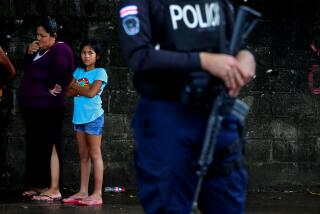Failure Worse Than Death for Bodyguards
- Share via
BOGOTA, Colombia — Hundreds of pigeons whooshed into the sky at the sudden crackle of gunshots, and passersby caught in the cross-fire fell mortally wounded on Bogota’s central square.
Mario Cruz dived to the ground with the young minister of communications. After the first adrenaline rush, he remembered he was supposed to be protecting this woman.
“In that moment you’re scared, of course, just like anyone else,” Cruz, still a government bodyguard, recalls of that November 1985 morning. “It’s like your heart is going to burst.”
Sheltering himself behind a statue of Simon Bolivar, machine gun in one hand, Cruz used the other to push down the head of the minister, Noemi Sanin. Twenty minutes later, an armored car rescued the two from the plaza.
The pair had stumbled into the start of an assault by leftist rebels on the Supreme Court--a two-day battle that claimed more than 100 lives.
Such moments may come only once or twice in a career for the men and women who have chosen to become government bodyguards in this violent land where public servants are periodically targeted by drug traffickers, leftist rebels, right-wing paramilitary groups and other armed criminals. But it is a risky job. Over the past decade, 113 of the protectors have died in the line of duty.
A bodyguard’s life became less risky after December 1993, however, when police caught up with and killed Pablo Escobar. The Medellin drug lord had sent legions of assassins against politicians and their “guardaespaldas.” In Spanish, the word loosely translates to “protects your back.”
Now, days once tense with danger are mostly exercises in tedium. But fear still resides just below the surface.
“Whoever says he’s not scared, well, he’s a liar,” says the muscular, graying Cruz, who has spent 19 of his 42 years protecting lives for the Office of Administrative Security, the state agency that guards presidents, Cabinet ministers, judges, lawmakers and their families.
The agency employs 2,000 men and women as bodyguards, paying them the equivalent of $660 a month, with retirement after 20 years for those who survive.
None has been killed this year, but a police officer working on a bodyguard detail for the wife of former presidential candidate Horacio Serpa was slain Sept. 14 by gunmen firing from a passing taxi as he drank a soda outside a hospital.
At least Officer Jesus Hernan Castillo, 32, did not fail Rosita Serpa, the woman he was protecting. That is a bodyguard’s worst nightmare.
Some never recover from the death of a comrade or--worse--of someone they were supposed to protect.
“You think, ‘What did I do wrong?’ ” says Andres Carrillo, who was one of Luis Carlos Galan’s bodyguards when assassins killed the charismatic presidential candidate in 1989. “You feel like you’re going to burst. It’s hard to breathe.”
Carrillo, 33, never even got a shot off at the attackers. He also lost a bodyguard comrade, who shielded the candidate with his body and died eight days later of gunshot wounds.
The Galan murder remains unsolved, but Carrillo is still on the job, these days guarding a government minister. He refuses to divulge a single detail about the person he accompanies throughout Colombia.
Some bodyguards succumb to alcoholism or emotional strains so severe they prompted the security agency to open a counseling office.
But counselor Maria del Pilar Raquejo says it’s difficult to get the bodyguards to cooperate because so many consider psychological counseling something “for sissies.”
For Mario Cruz, the day begins at 5:30 a.m., and he almost always leaves home before his wife and two children awaken. Often they are already in bed when he returns home, sometimes after midnight.
The hours on duty are spent mostly sitting around waiting, outside government buildings, in restaurants. Or else it’s riding around in cars with tinted windows, suspiciously eyeing passersby, fingers tense on the grip of a gun.
Cruz doesn’t wear a bulletproof vest. But he doesn’t go anywhere without his 9-millimeter Beretta pistol. “I love that weapon. I’ve had it all my life.”
Weekends are almost never free, and the pay is half what he’d make in the private sector.
But it’s all worth it, says Cruz, a man from a poor farm family who has spent years with some of Colombia’s most important officials.
“Not everyone can be with a president, a minister,” he says proudly.
More to Read
Sign up for Essential California
The most important California stories and recommendations in your inbox every morning.
You may occasionally receive promotional content from the Los Angeles Times.













